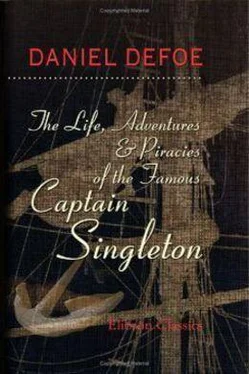At the end of twenty days' travel, as above, in the latitude of three degrees sixteen minutes, we discovered in a valley, at some distance from us, a pretty tolerable stream, which we thought deserved the name of a river, and which ran its course N.N.W., which was just what we wanted. As we had fixed our thoughts upon our passage by water, we took this for the place to make the experiment, and bent our march directly to the valley.
There was a small thicket of trees just in our way, which we went by, thinking no harm, when on a sudden one of our negroes was dangerously wounded with an arrow shot into his back, slanting between his shoulders. This put us to a full stop; and three of our men, with two negroes, spreading the wood, for it was but a small one, found a negro with a bow, but no arrow, who would have escaped, but our men that discovered him shot him in revenge of the mischief he had done; so we lost the opportunity of taking him prisoner, which, if we had done, and sent him home with good usage, it might have brought others to us in a friendly manner.
Going a little farther, we came to five negro huts or houses, built after a different manner from any we had seen yet; and at the door of one of them lay seven elephants' teeth, piled up against the wall or side of the hut, as if they had been provided against a market. Here were no men, but seven or eight women, and near twenty children. We offered them no incivility of any kind, but gave them every one a bit of silver beaten out thin, as I observed before, and cut diamond fashion, or in the shape of a bird, at which the women were overjoyed, and brought out to us several sorts of food, which we did not understand, being cakes of a meal made of roots, which they bake in the sun, and which ate very well. We went a little way farther and pitched our camp for that night, not doubting but our civility to the women would produce some good effect when their husbands might come home.
Accordingly, the next morning the women, with eleven men, five young boys, and two good big girls, came to our camp. Before they came quite to us, the women called aloud, and made an odd screaming noise to bring us out; and accordingly we came out, when two of the women, showing us what we had given them, and pointing to the company behind, made such signs as we could easily understand signified friendship. When the men advanced, having bows and arrows, they laid them down on the ground, scraped and threw sand over their heads, and turned round three times with their hands laid up upon the tops of their heads. This, it seems, was a solemn vow of friendship. Upon this we beckoned them with our hands to come nearer; then they sent the boys and girls to us first, which, it seems, was to bring us more cakes of bread and some green herbs to eat, which we received, and took the boys up and kissed them, and the little girls too; then the men came up close to us, and sat them down on the ground, making signs that we should sit down by them, which we did. They said much to one another, but we could not understand them, nor could we find any way to make them understand us, much less whither we were going, or what we wanted, only that we easily made them understand we wanted victuals; whereupon one of the men, casting his eyes about him towards a rising ground that was about half a mile off, started up as if he was frighted, flew to the place where they had laid down their bows and arrows, snatched up a bow and two arrows, and ran like a racehorse to the place. When he came there, he let fly both his arrows, and comes back again to us with the same speed. We, seeing he came with the bow, but without the arrows, were the more inquisitive; but the fellow, saying nothing to us, beckons to one of our negroes to come to him, and we bid him go; so he led him back to the place, where lay a kind of deer, shot with two arrows, but not quite dead, and between them they brought it down to us. This was for a gift to us, and was very welcome, I assure you, for our stock was low. These people were all stark naked.
The next day there came about a hundred men to us, and women making the same awkward signals of friendship, and dancing, and showing themselves very well pleased, and anything they had they gave us. How the man in the wood came to be so butcherly and rude as to shoot at our men, without making any breach first, we could not imagine; for the people were simple, plain, and inoffensive in all our other conversation with them.
From hence we went down the banks of the little river I mentioned, and where, I found, we should see the whole nation of negroes, but whether friendly to us or not, that we could make no judgment of yet.
The river was no use to us, as to the design of making canoes, a great while; and we traversed the country on the edge of it about five days more, when our carpenters, finding the stream increased, proposed to pitch our tents, and fall to work to make canoes; but after we had begun the work, and cut down two or three trees, and spent five days in the labour, some of our men, wandering further down the river, brought us word that the stream rather decreased than increased, sinking away into the sands, or drying up by the heat of the sun, so that the river appeared not able to carry the least canoe that could be any way useful to us; so we were obliged to give over our enterprise and move on.
In our further prospect this way, we marched three days full west, the country on the north side being extraordinary mountainous, and more parched and dry than any we had seen yet; whereas, in the part which looks due west, we found a pleasant valley running a great way between two great ridges of mountains. The hills looked frightful, being entirely bare of trees or grass, and even white with the dryness of the sand; but in the valley we had trees, grass, and some creatures that were fit for food, and some inhabitants.
We passed by some of their huts or houses, and saw people about them, but they ran up into the hills as soon as they saw us. At the end of this valley we met with a peopled country, and at first it put us to some doubt whether we should go among them, or keep up towards the hills northerly; and as our aim was principally as before, to make our way to the river Niger, we inclined to the latter, pursuing our course by the compass to the N.W. We marched thus without interruption seven days more, when we met with a surprising circumstance much more desolate and disconsolate than our own, and which, in time to come, will scarce seem credible.
We did not much seek the conversing, or acquainting ourselves with the natives of the country, except where we found the want of them for our provision, or their direction for our way; so that, whereas we found the country here begin to be very populous, especially towards our left hand, that is, to the south, we kept at the more distance northerly, still stretching towards the west.
In this tract we found something or other to kill and eat, which always supplied our necessity, though not so well as we were provided in our first setting out; being thus, as it were, pushing to avoid a peopled country, we at last came to a very pleasant, agreeable stream of water, not big enough to be called a river, but running to the N.N.W., which was the very course we desired to go.
On the farthest bank of this brook, we perceived some huts of negroes, not many, and in a little low spot of ground, some maize, or Indian corn, growing, which intimated presently to us, that there were some inhabitants on that side less barbarous than what we had met with in other places where we had been.
As we went forward, our whole caravan being in a body, our negroes, who were in the front, cried out, that they saw a white man! We were not much surprised at first, it being, as we thought, a mistake of the fellows, and asked them what they meant; when one of them stepped to me, and pointing to a hut on the other side of the hill, I was astonished to see a white man indeed, but stark naked, very busy near the door of his hut, and stooping down to the ground with something in his hand, as if he had been at some work; and his back being towards us, he did not see us.
Читать дальше












